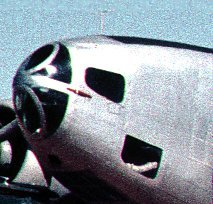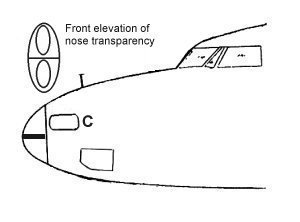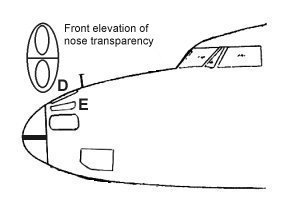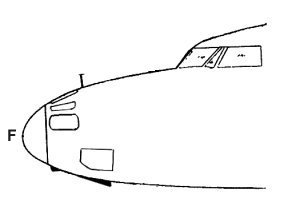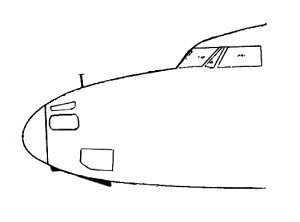|
1955
For
its newspaper delivery role, VH-SMM
had a hinged metal nose cap to facilitate loading newspapers in the nose
compartment. There were no windows in the nose. In January 1955 the Department
of Civil Aviation approved the fitment of R-1830-90B engines
in place of the previously installed R-1830-S1C3G. The DCA
also approved the installation of two additional perspex windows (A) in
the nose section. Photographs indicate that these were installed in the
lower aft position on both sides of the nose. Also approved were the installation
of crew oxygen and a camera hatch and camera mount near the rear door.
|
195?
A unique
framed transparent nose cap (B) was added, probably soon after the initial
survey modifications. This may have been of totally new construction or
it may have been a re-working of the existing metal nose cap. The new
nose cap featured two flat, framed oval windows. Apart from the framing,
the balance of the nose cap was also perspex.
|
195?
At
an unknown time, an additional window (C) was added on both sides of
the nose in the upper forward position.
|
By 1966
At
an unknown time, a standard Hudson upper window (D) was added on top
of the nose. What is known about window (D) is that it was present in
1967 when the aeroplane was modified with a forward camera position
but it had been skinned over by the time the aircraft was painted in
the orange scheme in 1970. Also at an unknown time,
another smaller window (E) also unique to VH-SMM, was installed
between the standard top window and the upper forward window. The framed
nose cap was retained. VH-SMM was re-registered VH-AGJ on 14th December
1966.
|
1967
In
January 1967, the camera position was relocated from the main cabin
to the nose compartment as was standard with all Adastra Hudsons except
VH-SMO/AGP.
At the same time, the unique framed nose cap was replaced with a standard
Hudson nose transparency (F).
|
1970
By
the time the aeroplane was painted in the orange colour scheme in mid
1970, the upper nose window had been skinned over. At the time of writing
(June 2002) the aircraft retains this configuration at the RAF Museum
in Hendon, UK.
|
![]()
